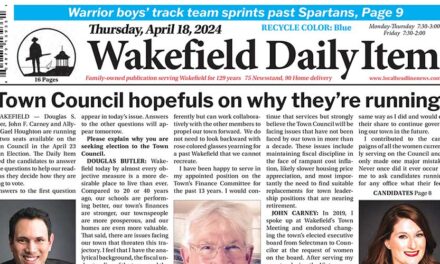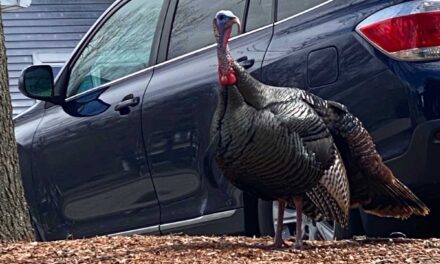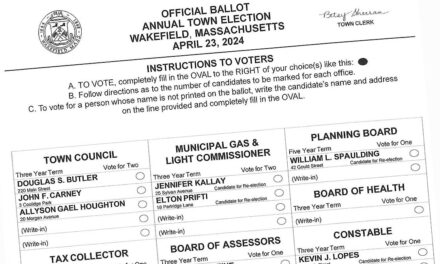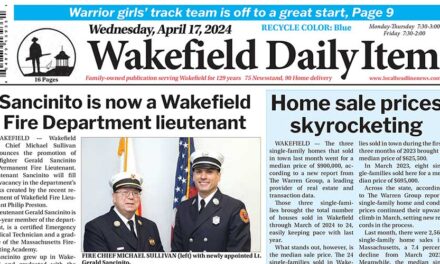Published in the February 16, 2016 edition.
By MARK SARDELLA
WAKEFIELD — The frigid holiday weekend kept local public safety personnel running all over town dealing with a variety of frozen and burst water pipes and sprinklers, as well as issues with gas heating systems.
Wakefield Municipal Gas & Light Department General Manager Pete Dion said that there were no real issues with the townwide electrical and gas systems due to the cold weekend, but the WMGLD did respond to 30-35 calls related to gas heating systems in individual homes.
Fire Chief Michael Sullivan said that his department had to deal with 22 calls directly related to frozen and burst pipes. Most of the frozen pipe issues were related to sprinkler systems, he said, but there were also calls for frozen and burst domestic water lines. The calls came from all over town and included homes, businesses and even a couple of town buildings.
Sullivan said that the best way to avoid frozen or burst pipes during extreme cold periods is to put insulation around the pipes or find a way to get some heat into the area where the pipes are located.
The worst thing a property owner can do, the Fire Chief said, is to use a torch or any kind of open flame to try to thaw pipes. He noted that the wood in areas of homes where pipes are located tends to be very dry and can easily ignite. He recommended other ways of trying to get some heat onto the pipes, such as using a hair dryer, opening cabinet doors under a sink to allow heat to circulate around pipes or using a portable space heater.
Sullivan also cautioned landlords who may have vacant apartments in their buildings against turning the heat off in those apartments in an effort to save money on heat as pipes in unheated apartments are especially prone to freezing.
Sullivan said that there is only so much that the Fire Department can do after frozen water pipes burst. They usually just shut off the water and assist the property owner with cleaning up the water, he said.
Sullivan pointed to some guidelines issued by the state Fire Marshal’s Office on how to deal with frozen and burst water pipes.
Tips for Dealing with Frozen Pipes
Open kitchen and bathroom cabinet doors to allow warmer air to circulate around the plumbing. Be sure to move any harmful cleaners and household chemicals up out of the reach of children.
When the weather is very cold outside, let the water drip from the faucet served by exposed pipes. Running water through the pipe – even at a trickle – helps prevent pipes from freezing because the temperature of the water running through it is above freezing.
Keep the thermostat set to the same temperature both during the day and at night. By temporarily suspending the use of lower nighttime temperatures, you may incur a higher heating bill, but you can prevent a much more costly repair job if pipes freeze and burst.
If you will be going away during cold weather, leave the heat on in your home, set to a temperature no lower than 55 degrees.
To Thaw Frozen Pipes
If you turn on a faucet and only a trickle comes out, suspect a frozen pipe. Locate the suspected frozen area of the water pipe. Likely places include pipes running against exterior walls or where your water service enters your home through the foundation.
Keep the faucet open. As you treat the frozen pipe and the frozen area begins to melt, water will begin to flow through the frozen area. Running water through the pipe will help melt more ice in the pipe.
Apply heat to the section of pipe using an electric heating pad wrapped around the pipe, an electric hair dryer or wrapping pipes with towels soaked in hot water. Do not use a blowtorch, kerosene or propane heater, charcoal stove or other open flame device. A blowtorch can make water in a frozen pipe boil and cause the pipe to explode. All open flames in homes present a serious fire danger, as well as a severe risk of exposure to lethal carbon monoxide.
Apply heat until full water pressure is restored. If you are unable to locate the frozen area, if the frozen area is not accessible, or if you cannot thaw the pipe, call a licensed plumber.
Check all other faucets in your home to find out if you have additional frozen pipes. If one pipe freezes, others may freeze, too.




